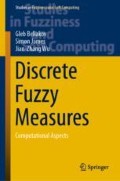Abstract
This chapter provides the main definitions and discusses different classes of fuzzy measures and relations between them. The defining properties of the special classes are used in the subsequent chapters for simplification purposes, or to represent semantics of their application.
Access this chapter
Tax calculation will be finalised at checkout
Purchases are for personal use only
Notes
- 1.
Decomposability usually requires \(\mathcal A \cap \mathcal B = \emptyset \), however this is not the case for possibility and necessity measures.
- 2.
A set \(\mathcal E\) is convex if \(\alpha x+(1-\alpha )y\in \mathcal E\) for all \(x,y \in \mathcal E, \alpha \in [0,1]\).
References
Beliakov, G., Bustince, H., Calvo, T.: A Practical Guide to Averaging Functions. Springer, Berlin (2016)
Chateauneuf, A., Jaffray, J.-Y.: Some characterizations of lower probabilities and other monotone capacities through the use of Möobius inversion. Math. Soc. Sci. 17(3), 263–283 (1989)
Choquet, G.: Theory of capacities. Annales de l’Institut Fourier 5, 131–295 (1953)
Denneberg, D.: Non-additive measure and integral, basic concepts and their role for applications. In: Grabisch, M., Murofushi, T., Sugeno, M. (eds.) Fuzzy Measures and Integrals: Theory and Applications, pp. 42–69. Physica-Verlag, Heidelberg (2000)
Dubois, D., Prade, H.: Possibility Theory. Plenum Press, New York (1988)
Grabisch, M.: The interaction and Möobius representation of fuzzy measures on finite spaces, k-additive measures: a survey. In: Grabisch, M., Murofushi, T., Sugeno, M. (eds.) Fuzzy Measures and Integrals: Theory and Applications, pp. 70–93. Physica-Verlag, Heidelberg (2000)
Grabisch, M.: Set Functions, Games and Capacities in Decision Making. Springer, Berlin (2016)
Grabisch, M., Murofushi, T., Sugeno, M. (eds.): Fuzzy Measures and Integrals: Theory and Applications. Physica-Verlag, Heidelberg (2000)
Grabisch, M., Nguyen, H.T., Walker, E.A.: Fundamentals of Uncertainty Calculi, with Applications to Fuzzy Inference. Kluwer, Dordrecht (1995)
Islam, M., Anderson, D.T., Du, X., Havens, T.C., Wagner, C.: Efficient binary fuzzy measure representation and Choquet integral learning. In: by Medina, J., et al. (eds.) Information Processing and Management of Uncertainty in Knowledge-Based Systems. Theory and Foundations. IPMU 2018. Communications in Computer and Information Science, pp. 115–126. Springer (2018)
Murillo, J., Guillaume, S., Bulacio, P.: k-Maxitive fuzzy measures: a scalable approach to model interactions. Fuzzy Sets Syst. 324, 33–48 (2017)
Narukawa, Y., Torra, V.: Fuzzy measure and probability distributions: distorted probabilities. IEEE Trans. Fuzzy Syst. 13, 617–629 (2005)
Shafer, G.: A Mathematical Theory of Evidence. Princeton University Press, Princeton (1976)
Sugeno, M.: Theory of fuzzy integrals and applications. PhD thesis, Tokyo Institute of Technology (1974)
Wang, Z., Klir, G.J.: Fuzzy Measure Theory. Plenum Press, New York (1992)
Weber, R.J.: Probabilistic values for games. In: The Shapley Value: Essays in Honor of Lloyd S. Shapley, pp. 101–119 (1988)
Zadeh, L.: Fuzzy sets as a basis for a theory of possibility. Fuzzy Sets Syst. 1, 3–28 (1978)
Author information
Authors and Affiliations
Corresponding author
Rights and permissions
Copyright information
© 2020 Springer Nature Switzerland AG
About this chapter
Cite this chapter
Beliakov, G., James, S., Wu, JZ. (2020). Types of Fuzzy Measures. In: Discrete Fuzzy Measures. Studies in Fuzziness and Soft Computing, vol 382. Springer, Cham. https://doi.org/10.1007/978-3-030-15305-2_2
Download citation
DOI: https://doi.org/10.1007/978-3-030-15305-2_2
Published:
Publisher Name: Springer, Cham
Print ISBN: 978-3-030-15304-5
Online ISBN: 978-3-030-15305-2
eBook Packages: Intelligent Technologies and RoboticsIntelligent Technologies and Robotics (R0)

